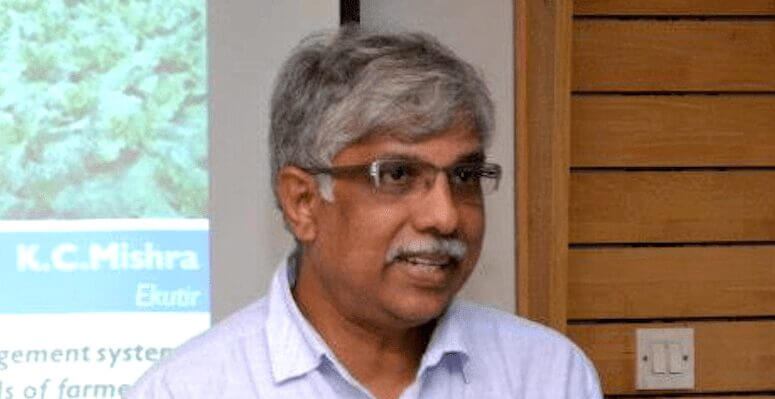Meet Krishna Mishra, Founder of eKutir Agriculture. Krishna is a social entrepreneur running a for-profit social business, eKutir, to work for the progress of small and marginal farmers and improve their socio-economic state.
Family Influence
Krishna grew up in a village of Odisha, a rural village that was surrounded by poverty and misery. He was deeply influenced by his father, a Gandhian who actively engaged in various development initiatives. As a child, Krishna observed and engaged with various relief efforts with his father. The famine that hit Orissa in the 1970s marked him deeply. He was moved by the way people coped with disaster and saw the nexus between poverty and food security from close quarters.
Seeking a future in government service, Krishna pursued his education in political science. His interest in psychology led him to focus on political behavior – a skill that helps him work with communities today. Convinced that agriculture is intrinsic to development in India, Krishna focused on exploring the interconnections between political structures and agriculture while pursuing his masters in political science. These experiences exposed him to various systems and seeded thoughts around designing political and community structures.
Empowering Farmers
Krishna joined NABARD, a development institution in 1983, to empower farmers. During the 23 years with NABARD, he worked closely with communities launching self-help and farmer groups in India whilst designing several products. After eight years of working on the ground, he moved to Delhi and was instrumental in policies that continue to be offered even today, including; watershed development initiatives and orchard plantation initiatives, (popularly known as WADI), in collaboration with various national and international corporations. Krishna was also responsible for the creation of incentives that would orient commercial banks to focus on the agricultural sector and reach the poor communities in India.
All these initiatives gave Krishna insights into the limitations of existing approaches and he felt the need to re-design structures under which farmers were organized to ensure that it was participatory in nature and could withstand the pressures of the market forces. He drew from models in the U.S. where bonds of cooperatives were traded upon. However, he slowly became convinced that products and services targeting the farmers were driven by supply of the private sector and government and not based on farmer demand. This made him realize that there was a need to create a farmer-centric, inclusive, and sustainable model, which will involve a holistic, yet personalized approach to address the needs of farmers and ventured out to establish eKutir in 2009.
Value chain dysfunction and highly disconnected eco-system
In 2009-10, eKutir initiated its pilot in Agriculture with 6 micro-entrepreneurs and 300 farmers. This pilot initiative was in collaboration with Grameen-Intel Social Business in extending soil-testing and nutrient management solution to the farmers. With a rigorous pilot for one year, the results were quite intriguing, with benefits perceived for both micro-entrepreneur and farmers. An understanding of the agriculture value chain and institutional service delivery followed this pilot.
In Agriculture itself, the sheer dysfunction of the value chain, highly disconnected eco-system, and exploitative strategies keeps the smallholder farmer trapped in poverty. This further characterizes low yields, low incomes, few or no market linkages, and low access to finance. The smallholder farmer is prone to high risk owing to small land acreage alongside lack of confidence and trust by the system in the farmers. A farming cycle is such that a smallholder farmer, with an income of about $1 a day, is required to undertake various activities apart from laboring on the field. The farmer must assess the state of the soil, determine the choice of input supplements, application methods and best growth practices, acquire seeds and other inputs, manage pests and diseases, access credit and market information, organize transport, and identify purchasers for the produce.
Promoting productivity and income
The innovation of eKutir is in designing a decentralized, risk-mitigated, and transparent system to extend agriculture services to the farmers. This led to the creation of “PIE” model, which is widely accepted to extend agriculture and non-agriculture services to the rural communities. In 2013, eKutir established Krishi Vikas (Farmer Development) to extend its PIE model and a gamut of agriculture services to more than 50,000 farmers. The model has been widely accepted by NABARD to promote smallholder productivity and income for 50,000 additional farmers by 2015. Gradually, the model has gained acceptance and spread to 4 different states with different field partners in India.
Grameen-Intel Social Business has deployed the ICT-enabled tools, co-designed through the domain knowledge and expertise of eKutir, in Bangladesh and Macedonia. International Fund for Agriculture Development (IFAD) is taking the technology to countries like Cambodia and Nepal for the benefit of smallholder farmers.
PIE stands for Participatory, ICT enabled and Entrepreneurship-driven approach.
eKutir creates a distribution network of micro-entrepreneur independently or in collaboration with its field partners.
- Identification, selection and training of micro-entrepreneurs
- Market Opportunity and Gap Analysis
- Business Planning and Handholding
- Designing the Eco system to address to that problem
ICT-enabled tools under current deployment includes:
FPMT – A one-stop tool used to capture data, manage portfolio of the farmers, provide market linkages, access to advisory services, and aggregate demand-supply. This tool allows the potential input suppliers and buyers to gain access to a group of farmers, which becomes an opportunity for them to provide quality products at affordable prices. FPMT allows the farmers to choose quality inputs and sell the produce at fair prices, creating value through the agriculture value chain.
Seed Selection Tool (ankur) – ankur is a seed selection and recommendation tool. Last-mile entrepreneurs use Ankur to assist farmers with better seed selection to achieve increased productivity and farm yield.
Nutrient Management Tool (mrittika) – mrittika is the soil nutrient analysis and recommendation tool. Last-mile entrepreneurs offer soil-testing services to the farmers and use mrittika to analyze the results to recommend fertilizer for achieving cost-effective and optimum productivity.
There are several other software applications that are under development and will be rolled out in the next 5-10 years.
Equipping farmers with the necessary soil knowledge
eKutir piloted mrittika, a software application that recommends nutrient application on the basis of soil-testing analysis. The value proposition of this tool was to equip the farmers with the necessary knowledge about their soil, crops to be grown, and the requisite application of nutrients and fertilizers, basis of soil characteristics.
When the first phase of pilot was conducted with 300 farmers, it created excitement among the farmers on seeing the soil testing conducted in front of them at their farm. When the test results were presented, the farmers were astonished with the appropriateness of soil analysis, as majority of these farmers had faced challenges in procuring the soil testing report timely, from the soil health centers established by the Government. The approach of using mobile soil test kits at the farm increased the inquisitiveness of the farmer and helped in disseminating appropriate knowledge on testing and soil health.
Post soil testing, the results were entered in to mrittika, which on the basis of the farmer information captured provided the quantity, quality, and availability of nutrient/fertilizer on the farmland. The software tool had a detailed step-wise algorithm at the back-end with a simplistic user interface to help the micro-entrepreneur enter details and get corresponding recommendations. The software application allowed localization and customization, tailored to a particular region. When compared with the current dosage given by the farmers, it was understood that there was over-application of fertilizers, which were spurious, and were bought at unfair prices.
To test the efficacy of mrittika, a control and treatment group were created. The control group applied the same dosage wherein the treatment group applied the dosage recommended by mrittika with the nutrient procured through eKutir. The results were overwhelming for the treatment group with the best farmer showing 133% reduction in costs, 200% increased crop yield, and 250% increased income on the crop. This established farmer’s trust in eKutir and helped us organically increase our outreach without any additional marketing.
The initial reaction of the farmers helped eKutir build a sense of trust and credibility, which increased farmer’s confidence in the system, and made them understand that this is a non-exploitative way to help them become more productive.
As, eKutir believe in designing appropriate software applications to benefit the needs of the farmers, eKutir came up with additional tools like ankur, FPMT, TIME Tool, and so on to help address the small gaps in the agriculture value chain, with a vision to create a suite of ICT-enabled tools that will help drive our mission to benefit millions of smallholder farmers.
LinkedIn: https://www.linkedin.com/company/ekutir
Facebook: https://www.facebook.com/eKutirSB
Twitter: https://twitter.com/ekutirsb
YouTube: How eKutir works
Vimeo: http://vimeo.com/71197753

































